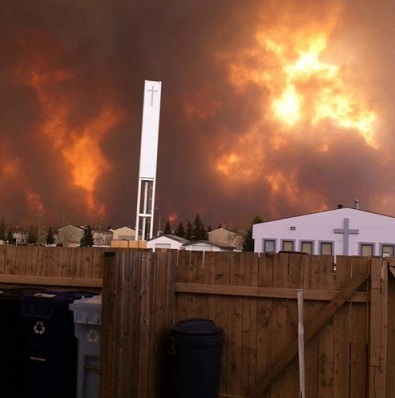Photo courtesy Robyn Paquette, Facebook.
A Dene nation near Fort McMurray has launched into action to help evacuees in any way possible.
Chipewyan Prairie First Nation is about an hour south of Fort McMurray.
On Monday night, there were many images flooding social media – pictures of hundreds of cars stuck on the main highway to Edmonton, fleeing Fort McMurray.
On another popular path, Highway 881, members of the Chipewyan Prairie First Nation are offering food and shelter.
Band member Courtney Warawa says in the hamlet of Janvier – about 120 kilometres south of Fort McMurray – people have been gathering together to offer help in any way possible.
The multiplex and clinic are open and available for people to rest.
“There are people in the community who are making food, and making coffee, tea, just for those who need it just to relax and be focused and maybe head out on the road again,” Warawa said.
Warawa was up into the wee hours of the morning, coordinating deliveries of gas to those stranded on the highway.
The multiplex has become increasingly busy as the 700-bed work camp near Janvier, called Moose Haven Lodge, has filled up. Youth and other local residents have arrived to flip pancakes and feed people who travelled by bus for upwards of 10 hours.
On Tuesday night, the First Nation-owned work camp was only staffed to accommodate 30 people, said Pamela Nokohoo, who lives nearby.
Nokohoo and several other women from Janvier headed out there to see if they needed a hand. The scene was calm at first, but they stuck around, knowing that if evacuees were to stop anywhere, it would be the lodge.
Sure enough, a frenzy of activity started at midnight heading into Wednesday as busloads started to pull in.
“A lot of the bedrooms weren’t made. So between four ladies, we made up – put bedding and towels – in 250 extra rooms last night (Tuesday night),” she said.
Nokohoo and other volunteers started registering the guests, getting them fed, and taking them to their rooms.
Between midnight and 7 a.m. on Wednesday, Nokohoo said they checked in more than 600 people.
Evacuees arrived tired and hungry after spending up to 13 hours on the buses. Bus drivers had worked 36 hours straight in some cases, she said.
The word that Nokohoo heard over and over again was “surreal.”
“It seems like almost everybody wanted to tell their story as well, what they went through, what they had seen. But at the same time they were just tired. It’s emotionally draining, it’s physically draining. I could only kind of imagine trying to see all of that and not knowing if you even have a home to go back to,” she said.
Those evacuees would have traveled through the kind of scenes that filled social media on Monday. A striking video posted by Cody Harkins on Facebook showed the grim picture that people saw as Fort McMurray was evacuated.
A clear example of the chaotic rush to get people out of Fort McMurray safely, and quickly, was made evident as Nokohoo saw the buses empty out.
“One or two of those busloads were children, children that were picked up from school with their teachers, that are at the lodge. They’re not even with their parents, they’re with their class,” she said.
The next step for many evacuees will be to reconnect with their families.
Nokohoo’s family has experienced that chaos as well. Work camps north of Fort McMurray filled up with evacuees on Monday, and her nephew actually had to drive back through the flames to get south.
She noted that people who have run out of gas are still stranded on the highway.
Even after a night of only an hour and a half of sleep, she was wide awake.
“I’m not even tired. I just feel like I should be trying to do more because if I was in that situation I would hope people would go out of the way, do that for me and my children as I’m trying to do it for them,” Nokohoo said.
Warawa says helping out in this way, is no surprise for Dene people.
“Our people are really helpful. Any devastating thing that’s happened, everyone comes together as one. They’re always helping, opening up their home, their hearts, they’re just there to help everybody. No matter what, no cost at all, they’re just there for you,” she said.
Members of the First nation have close connections to the city – it’s a shopping destination, and students from the area often go to high school in Fort McMurray.
The economic slowdown in the oilsands has been difficult for people in the area, but it has benefited evacuees who can stay together in large numbers at work camps that aren’t currently busy. Communities simply don’t have the same kind of facilities to take on hundreds of people, Nokohoo said.
She pointed out that a big contract for Moose Haven Lodge recently ended.
“They had a huge winter contract where the camp was at like 300-plus people. And the contract ended after the slashing season went down, so yeah, their numbers did drop. So I guess it was kind of beneficial because if there hadn’t been I don’t know how far those buses would have had to drive,” she said.
“I think a lot more people would have been dispersed and separated as a family.”
